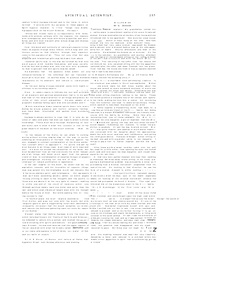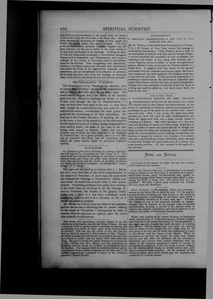< Lady Shelley a Spiritualist (continued from page 3-180) >
ture, was undoubtedly a medium. In his rebellious hatred for all forms of oppression, political and religious, he had not only emancipated himself from all sectarian fetters, but had thrown off, as he supposed, all belief in God and a future life. But he was wiser than he knew. Throughout his writings his internal consciousness is continually contradicting the merely external errors into which he had fallen Belief in immortality was as natural to his heart as love of the beautiful. But he had been foully persecuted because of his anti-religious notions, and he too hastily confounded all belief in things supersensual with the systems whose tyranny he abhorred.
Shelley was subject to trances, and was partially a somnambulist. In her admirable “Shelley Memorials,” Mrs. Shelley relates several instances, showing that he was undoubtedly a sensitive. He was drowned, it will be remembered, in the wreck of his own small sailboat, in a violent storm, on his return from Leghorn to his house, on the gulf of Lerici, July 8, 1822. His friend Williams, who perished with him, wrote in his diary, on the previous 6th of May, the following passage:—
Fine. Some heavy drops of rain fell without a cloud being visible. After tea while walking with Shelley, on the terrace, and observing the effect of moonshine on the waters, he complained of being unusually nervous, and, stopping short, he grasped me violently by the arm, and stared steadfastly on the white surf that broke upon the beach under our feet. Observing him sensibly affected, I demanded of him if he was in pain; but he only answered by saying, ‘There it is again? there!’ He recovered after some time, and declared that he saw, as plainly as he then saw me, a naked child (Allegra, Lord Byron's daughter, who had recently died) rise from the sea and clasp its hands as if in joy, smiling at him. This was a trance that it required some reasoning and philosophy entirely to wake him from, so forcibly had the vision operated on his mind.”
We are glad to see so honored and conspicuous a name as that of Mrs. Shelley associated with the cause of Spiritualism. The experiences of her married life, her knowledge of the noble and gifted being who has entwined her name imperishably with English poetical literature, have undoubtedly helped much to satisfy her that the facts on which Spiritualism is based are eternally and impregnably true. Long and happily may she live, cheered by the mellow light shed on her declining days from the unseen world—from the land where Shelley awaits her.
< Eminent Rosicrucians (continued from page 3-180) >
In the last chapter of this book, he shows how by his aspiration towards, and his invocation of, superior things, man may ascend into the intelligible world, and become like to the more sublime spirit, and intelligence. He represents man, as it were, ascending Jacob’s ‘adder, on which angels throng, striving to reach to the thoughts and the points of those who are above it, at the very gate of heaven; seeking to strike one end of the chord of harmony which runs through spiritual realms, each one holier and purer than the last, and which shall vibrate at length even with his thought before the throne of God. But while seeking this, his, closing counsel is, that,—
“In the first place, we must implore assistance from the First Author, and pray not only with the mouth, but with religions gesture and a supplicating tone—also abundantly, incessantly, sincerely—that He would enlighten our minds, and remove the darkness gathering upon our souls, by reason of our bodies.’’
Disraeli states that before Agrippa wrote the book by which he is best known, his “Vanity of the Arts and Sciences,” he intended to reduce into a system, and marked the secret of communicating with spirits and demons. “On good authority,” says Disraeli, “he was well assured that the upper regions of the air swarmed with what the Greeks called daimones, just as our lower atmosphere is full of birds, our waters of fish, and our earth of insects.”
Willpower
Justinus Kerner relates:—“My grandfather visited his native place, to see a distant relation of his, a very ill-matured woman. He was received by her at the door of her house, and she introduced him to her apartment. She wore her usual house dress, and a bunch of keys hung at her side. She then showed him into her bedroom, when behold! There was lying in bed that very same woman, oppressed by disease and weakness, who, a moment before, was at his side apparently full of health. Shortly afterwards she died in his presence. He attended her funeral as a mourner. On the way to the cemetery, my grandfather and another attendant saw the figure of the deceased sitting on her coffin, dressed in the same way mentioned, and with the bunch of keys at her side. The removing of the coffin from the hearse did not disturb her, who remained sitting still, but the apparition vanished after the coffin had been Towered into the grave. From that day, the house she lived in was so signally haunted that it had to be demolished.
In Wieland’s Euthanasia (vol. 85, p. 217, Vienna, 1814, Bauer), we find the following story:—
“Mrs. K—, a charitable, kind, self-denying creature to the uttermost, was subject to fits of somnambulism. Whilst asleep she would leave her bed, dress, wander about the house, and attend on some household business. of which she had no recollection when she awoke. Oftentimes she was seized with a sort of catalepsy, suddenly coming upon her, even when sitting cheerfully talking to her family. These fits would produce a complete loss of her senses, and rigidity in her limbs, making her look like a statue. On recovering from this condition, she used to relate extraordinary things, which seemed to have been impressed on her mind.
“A Father Cajetan, a Benedictine monk, had been for a long time an intimate friend of the K— family, but being removed to a distant monastery, continued his friendly intercourse with the family by writing. Some time alter, on recovering from one of those cataleptic fits, Mrs. K—informed her only daughter, a girl of eighteen, that she (Mrs. K—), would die, giving the day and hour when the event would happen; forbidding her, however, to reveal the prediction to anybody. At last the day foretold arrived. Mrs. K—was quite cheerful, and seemed in much better health; she conversed with her daughter about her approaching; death, but with much calmness and indifference, and giving her child good advice. Towards midnight, whilst sitting in her bed, she said with a graceful smile to her daughter, ‘I will go to pay a visit to Father Cajetan, and bid him farewell.’
“After these words a sweet slumber came over her, and she slept for a little while; then opening her eyes, she looked with calm and love upon her dear daughter, and closed them again for the last time.
“At, that very hour Father Cajetan, who was then residing at Bellinzoa, 150 miles away, whilst sitting in his study preparing a mathematical problem, was aroused by a noise, as if proceeding from a musical instrument, suspended from the wall of his cell. On looking in that direction, he saw the form of a woman, dressed in white, looking at him in a friendly manner, and whom he recognized as his intimate friend, Mrs. K—, The apparition soon vanished, leaving in the monk’s mind the impression of her death, especially when, on looking at his musical instrument, whence the sound had proceeded, he found it broken. The next post informed him of the melancholy event in the K—family.”
“Dr. J. E. Nurnberger, in his ‘First Love,’ at p. 73 relates:—
“It was about half an hour after midnight, the moon stood in the meridian, and shone bright upon the high road, which ran in a straight line across the forest. Except the sound of my horse’s hoof, all was silence around me. At one of the crossings of the road, all at once my steed startled, and then stood still. Somewhat frightened myself, with spur and bridle I excited him on; but in vain: the horse trembled and refused to proceed, and on my further forcing it to go on, rose on his hindlegs and nearly fell backwards, a thing quite unusual in this quiet animal. At last I saw the white form of a female crossing the road, and as it approached, I could not help, by her shape, demeanor, and easy, light step, recognizing Eliza. I felt felt my senses leaving me, and when I recovered them, the phantom had disappeared, and my steed had resumed its pace. But Eliza was not dead, for I met her that very day, and such must have been the affinity of our souls, that she manifested at a distance to the partner of her love. Our meeting, however, was, alas! but very transitory. Seized by a fever, and reduced to a sick bed, within four weeks of her apparition in spirit, that once blooming girl lay a corpse.”
A Noteworthy Seance By. Mrs. Thayer
A correspondent writes that he was present at a seance recently held by Mrs. Thayer, the flower-medium, at the house of a gentleman in Roxbury, without prearrangement or knowledge by any of the party or the medium that a seance was to be held. After a cup of tea, the lights were extinguished, and there fell upon the table instantaneously and before the lights were fully out, a large circular wreath of evergreen and flowers. Also within the space of a few minutes, two specimen of quartz rock with a large proportion of mica, a handful of beach sand, moist and salt as though just taken up from the shore and containing about a dozen small shells and several pebbles, several branches of tuberoses, two bunches of grapes (by request), two branches of a sumach tree, and a quaint-looking, antique table-knife, which was said to have been brought and again taken away at a sitting held some months previous. All this occurred in the space of a few minutes.
Editor's notes


